|
Kissing is also a prominent part of our culture. Kisses resurrect princesses in fairy tales, offer greetings and make movies romantic.
Lips serve many purposes, eating and communicating. Kissing has its own purpose. They send physical sensations, sexual excitement, feelings of closeness, motivation, and even euphoria across the body via a series of brain impulses and hormones. Kissing represents two bodies becoming one. Studies of kissing show there’s a lot more going on than just locking lips. There may be an evolutionary component involving pheromones which communicate information at a primal level. Kissing would be an efficient way to transfer pheromones if this is so. Besides all that, the lips have the thinnest skin of any part of the human body, yet a very high concentration of sensory neurons. These neurons fire off during a kiss, triggering pleasant feelings, strong emotional and physical responses. Chemicals that regulate stress, motivation, social connection, and sexual excitement are all released when two people kiss. There are many studies about kissing, but its purpose and origin remain elusive. Examination of kissing reveals many layers of complexity in this seemingly instinctual behavior. Meanwhile, couples continue to enjoy kissing for their own reasons! Do you enjoy kissing your partner? What does kissing mean to you? If you read my previous post, you’ll note that lingering kisses are a hallmark of happy and enduring couples. It’s worth a shot isn’t it? MUWAH! Allison
Comments
Kissing is an act of intimacy that conveys many things. It might convey closeness and connection—an expression of emotional or physical intimacy.
Passionate kissing might express intense physical or sexual attraction between two people. But kissing may also be a source of comfort or reassurance. In times of difficulty or sadness, it's a nonverbal way to express love and encouragement. Kissing can be a sign of reconciliation and forgiveness in some situations. After an argument or dispute, it might be a way to make amends. Kissing someone on the cheek or briefly pecking them on the lips is a popular form of welcome and farewell in some cultures and families. Kisses might be part of celebrations, spreading joy at marriages, birthdays, job promotions, etc. They might also just be joyful expressions of affection. This act of “kissing” is very versatile in communicating a message. It really is all about the nonverbals, isn’t it? When it comes to your partner, you don't want just any kiss. It’s got to be special. Research tells us that a kiss that endures for at least six seconds is the one that increases connection with your partner. A six-second kiss is just long enough to feel romantic but also, short enough to leave them wanting more. Most couples I work with are assigned a daily six second kiss. I have them do a trial run in front of me in session while I count one thousand, two thousand, three thousand, etc. They get to experience how long six seconds really are! Sometimes this feels uncomfortable, especially when our connection is a bit lacking. If it feels uncomfortable, let’s try to work through that. Repeated practice reduces the difficulty. Use a future vision mindset to get there. How do you view your ideal relationship? Do you share lingering kisses with your partner? If so, what’s stopping you from implementing this now? Your future requires change! As I mentioned, six second kisses are backed by research by Jon Gottman. Use the techniques that are proven to work! Let me know how it goes! Allison  1.Extend your exhale. This is probably the simplest way to reduce anxiety. When you’re anxious, too much deep breathing can cause you to become even more anxious. Be mindful of pushing all the air possible out of your lungs. Then inhale naturally. Be attentive to exhaling longer than your inhale lasts. Count, if that helps. Try taking 10 breaths with this technique. 2. Belly (or Diaphragmatic) Breathing. I call this big belly breathing because you are going to blow up your belly like a beach ball. You can do this in any position, but it is helpful to do it while lying down when first learning belly breathing. Lie back in a comfortable pose and put your hands on your belly. Inhale slowly, directing your breath to your belly. Notice as your belly expands and your hands move along with your breath. Exhale, continuing to focus on the movement of your belly. Try to focus on the breath coming in and then going out of your body. Continue this practice until you feel more calm. 3. Breath Counting.
This technique allows you to measure your breathing, and it will adjust to the rhythm of your counting. Practice this at first in a comfortable position, but you can do this technique literally anywhere you like. While practicing, you might want to close your eyes. Notice your breathing. A relaxed person has a slow rate of breathing. You want to make your breathing slower than it currently is. Once you have the pace worked out, begin to count as you inhale, 1...2...3…4. Then count as you exhale, 1...2....3....4. Slow your counting down as you go. Continue this process until you feel more calm and grounded. 4. Sighing. The process of making noise when you breathe can be calming to an anxious nervous system. This is one you may want to do in private! Again, in a comfortable position, take a deep breath. As you exhale, make a loud sighing noise almost like a growl. Inhale and repeat the noisy exhale. This may seem like the silliest technique, but it works! Too much anxiety is no fun. When we’re feeling on the verge of panic frequently, we need to find some ways to reduce it. The goal is to be happier and healthier! Change the behaviors that have positive impacts! Try these and let me know how it goes! Allison 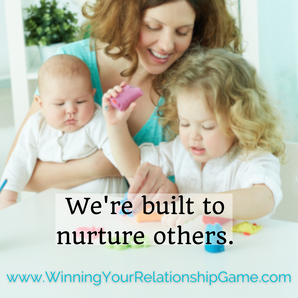 Most people have an innate capacity for nurturing and providing care for others. Women, especially, are encouraged to anticipate and meet the needs of others. We are built with the purpose of nurturing children, families, jobs, communities, and the world. Most of us take our responsibility to care for one another extremely seriously. Those people in our lives who need to be cared for receive our undivided attention and best efforts. I am no stranger to burn out or the drive that keeps us on that road! Many of us do not have anyone else in our lives who is aware of our individual boundaries. That is a responsibility that falls squarely on our shoulders. How much of your time and effort do you put into tending to your own needs? We tend to believe we can put off caring for ourselves indefinitely while nourishing all these other people in our lives. The beauty of taking care of yourself is that it will bring a sense of calm and abundance to all your connections, which is its greatest benefit. Consider the following: Are you better prepared to deal with a stressful situation after you’ve spent 15 minutes reading an enjoyable book or rushing to complete a tedious report for work? What are some of the things that make you feel pampered and indulged? A steaming mug of tea to enjoy while you relax on the back porch? Eating dinner in the glow of candlelight? Taking a relaxing soak in my bathtub is one of my favorite things to do. Because it provides such a sense of indulgence, I made the decision a few years ago that I was going to treat myself to it daily. And I have! The novelty of taking a bath has never worn off for me, although I’m not always mindful of it. Show yourself a little loveliness! Let me know how it goes, Allison 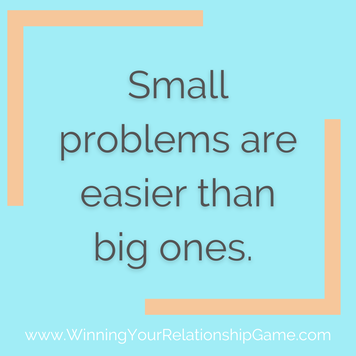 Relationships take a lot of time, attention and effort to be winning ones. Sometimes, you may avoid “checking in” because you want to avoid any negative feelings lurking there. You don’t want to mess up a good thing. Checking in on a regular basis can help you catch issues when they’re small. Ignoring or overlooking things that bother you, leads to bigger resentments which can’t be overcome if they go too far. These six easy questions will give you a quick gauge of your relationship:
Relationships involve give and take, ups and downs. Mastering the flow is something you’ll be studying for the rest of the relationship. Small problems are easier than big ones, so don’t ignore them. You won’t always feel great about all these questions. Checking in consistently and persistently sets the stage for a winning relationship. How's it going? Allison 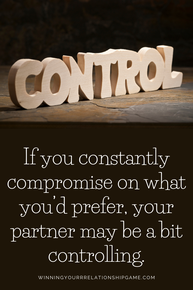 Are you in a relationship that feels controlling? Are you free to think and behave in a way that’s ok for you? Or do you repress what you think and feel because you’re afraid you’ll upset your partner? I don’t believe we should act on every impulse that we have, but if you notice that you’re controlling yourself specifically so you won’t upset your partner, you might be in a relationship with someone who’s overly controlling. If you think you know a controlling person when you see one, read on. You may be surprised. Obviously, someone who uses physical abuse has a control issue. People who batter others are usually very good at convincing the victim that they provoked the violence. If you’re in a situation like this, find a way to get help. There are many types of domestic violence perpetrators, but assessing someone’s level of dangerousness is a job for professionals. Leaving your partner may seem overwhelming, but sometimes a crisis precedes change. Be safe. Care about yourself enough to stay safe. While your partner may not be violent, other controlling people use threats or intimidation to control others. While there may not be a physical threat, your partner may refuse to speak to you when they’re upset. Your partner may leave home for a period of time after a disagreement. There’s some action intended as “punishment” or “teaching you a lesson”. Partners work better as equals. One person acting as a disciplinarian indicates a strong power imbalance in the relationship. Sometimes, power discrepancies aren’t this bold. Your partner may get angry or annoyed if you behave in a way they don’t agree with. Because we fear breaking that attachment bond, we are willing to compromise ourselves to keep it stable. So instead of saying, “I want to buy the Honda”, we go along with our partner’s wish for a Toyota. Again, certainly relationships require compromise, so there’s a fine line here. But if you constantly compromise on what you’d prefer, your partner may be a bit controlling. In my experience working with couples, the biggest control issue I see is when one partner tells the other person how they think or feel. Have you ever been in an argument and your partner said, “I know you’re laughing about me!” or "You don't care!". Is that what you were thinking? Maybe your partner is a mind reader, but most people aren’t. So many couples I work with have one partner who insists they know what the other person is thinking or feeling. Even when that person tells them it’s not true. This is a more subtle way in which we attempt to control or are controlled. The dissenting partner often says, “You’re going to believe what you’re going to believe.” Have you ever noticed this in yourself? Did you have a hard time believing your partner’s story because you were so busy believing your own version? The truth is, no one can ever know our internal experience unless we share it with them. In the same way, we cannot know another person’s internal experience. Allowing ourselves to open up and giving our partner space to tell their own truth builds emotional intimacy. That’s steroids for Winning Your Relationship Game! Action: Recognize controlling behaviors in yourself or your partner. There’s a good article here. Read more in this series to find out how to better handle controlling people. Peacefully, Allison Have you been with someone who’s controlling? Did you recognize any of these controlling behaviors in yourself? Tell me about it below. 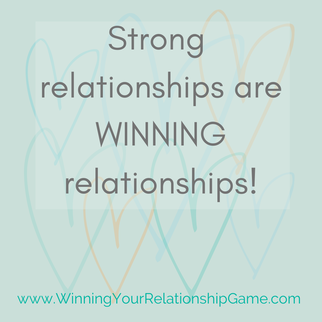 We’re all looking for ways to strengthen our relationships. All relationships have their own unique path. Some are respectful and polite. Some are abrasive and filled with conflict. I always approach each partnership with the expectation they can and will be willing to change for the sake of the relationship. Long term, relationships are a lot of work if you want them to endure. I’ve often referenced the relationship cycle I work from. Conflict arises, negotiation ensues, and higher levels of connection are reached. Sometimes the conflict seems unconquerable. It is then, more diligence and attention is urgently needed. However, there are things you can do to all along to make minor adjustments before a crisis occurs.
There will always be difficult times in any relationship. Knowing and preparing for this can help you overcome those obstacles. Practice negotiating for the best outcome for you both and get better with each and every conflict. Strong relationships are WINNING relationships! Cheers! 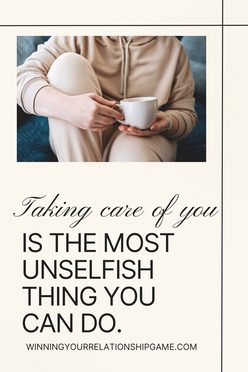 What's the one trick to handling everything better? This answer may surprise you. If you’re committed to change, you have to maintain your own personal resources. Your personal resources are what you possess within you which allows you to manage life. To make behavior changes, you have to draw on these resources. If you can visualize a container you carry with you containing your personal resources. They’re always there and available to draw on. Because you draw on them, they have to be replenished regularly. Remember, your life performance depends on these resources. At times when they’re low, you won’t handle things as well as you might when they’re adequate. Your best chance to perform well is keeping your personal resources at maximum capacity. To manage them well, you have to be aware of where your capacity level is, know how to replenish them and know what drains them. To illustrate: Mom leaves work, picks up the kids, and has to get home and get dinner on the table. Scenario #1-Mom had a crappy day. There was an accident on the way home. When she walks in, she realizes she’s forgotten to take something out to cook for dinner. She’s tired, upset, running late and trying to decide between takeout pizza and grilled cheese sandwiches. One of the children comes into the kitchen and says, “Mom, come see what I made at school!” Mom responds in a frustrated tone, “Not now, I’m busy. Go get started on your homework.” Scenario #2-Mom had a great day at work. She got off early and picks up the kids. Walking in the door at home, she smells the lovely scent of pot roast. She remembers putting it in the crock pot this morning. Now all she has to do is heat a veggie and dinner will be served. One of the children comes into the kitchen and says, “Mom, come see what I made at school!” Mom responds with a smile, “Sure! Do you need some help with your homework too?” The difference in those two scenarios is the level of mom’s personal resources. In scenario #1, she is depleted. She’s scraping the bottom of her resource container. In scenario #2, her container is overflowing. When your container is overflowing, you can pour yourself out generously on those around you. Your first challenge is greater self-awareness. Take a moment to look back over your week. Identify a time when you reacted poorly in a situation. Were your personal resources low? Do you know what drained them? Now you know, you can’t unknow it. So being aware of your level of personal resources, you have to take charge of them. How can you keep them as high as possible? You must learn to keep balance between doing things for yourself and doing things for others. If you have a program of excellent self-care, you’ll keep your resources high. When I talk about self care, I always get this question: “Isn’t that selfish?” Taking good care of your personal resources is the most unselfish thing you can do. When you are full, you can’t help but spill over on everyone else. You’ve encountered these people. Someone with good levels of personal resources is happy and joyful, open and giving. Someone whose resources are depleted is resentful and bitter, doing things grudgingly. So what fills you up? Keeping your personal resources at a high level requires awareness, replenishment and eliminating the drains to your resources. You need your personal resources to fuel making behavior changes and sticking to a plan. It’s hard to resist impulsive or habitual behavior when resources are low. In my work with addictions, there’s an acronym to stress times of high risk for relapse potential. It’s helpful to keep people on track with behavior change too. The acronym is HALT-Hungry, Angry, Lonely and Tired. I like to add Rushing, Distracted or in Pain. Any of these deplete your personal resources. In addition, any unresolved issues can be a hole in your bucket. Childhood trauma or other huge stressors will continuously drain your container. Once you know what’s draining it, you have to take steps to eliminate the drains as quickly as possible. To be effective in maintaining behavior changes and dealing effectively with others, you must be responsible to maintain your own personal resources. Now let’s twist this up a bit: Your partner has a container holding their personal resources. Their container has to be replenished regularly. Their life performance depends on these resources. At times when they’re low, your partner won’t handle things as well as they might otherwise. Go back to the mom story. The child in the story behaved the same in both scenarios. The child was in no way responsible for mom’s response. The only difference was the level of mom’s personal resources. Mom’s response had absolutely nothing to do with the child. Look back over your week. Was there a time your partner acted poorly? If you were involved, did you take it personally? Is it possible their personal resources were low? What was draining them? What fills your partner up? What drains your partner’s container? What holes does your partner have in their container? If you began to have empathy for your partner how much difference would it make in your feeling hurt? Being attentive to your own personal resources will help support your good in the world. Being aware of low resource times can help you and your partner avoid taking reactions personally. Recognizing times of high risk for impulsivity can further reduce misunderstandings. The recap:
Practice Time: There’s a worksheet for this post here. Take the time to learn and understand more about yourself and your partner. It’ll be worth extra points if you do! Contact me if you have any questions! I’d love to hear from you. Allison  Taking care of your spirit is an important part of taking care of yourself. Self-care is a way to take care of your physical and mental health, but it's also important to pay attention to your spiritual needs. Consider these ten tips if you want to take better care of yourself in a way that makes you feel strong spiritually. Tip 1: Don't ignore or hide your feelings. Instead, talk about them. Trying to keep your feelings inside instead of letting them out can cause a lot of pain on a spiritual level. Instead, let yourself be emotional when you're feeling it. Laugh, cry, talk about your problems, and let yourself really work through what you're feeling. It will take a lot of weight off your spirit. Tip 2: Find a way at the end of the day to "dump your brain." Whether you talk to a trusted friend, write in a journal, or walk yourself through your whole day, finding a way to "dump" all the things you've been thinking about is a great relief for your spirit. Rather than keeping all the feelings, experiences, and conversations you had during the day in your mind, letting them go lets your spirit rest. Tip 3: Do some light meditation to help you center yourself and get back on track. You don't need expensive classes or a fancy teacher to meditate. You can do it just about anywhere. Some simple exercises, like taking deep breaths and repeating a mantra, are great ways to meditate and bring your spirit back into balance. Tip 4: Make a playlist of funny videos to watch when you need a quick pick-me-up. The best medicine really is to laugh. Keep a playlist of videos that are sure to make you laugh on hand for those days when you need a good laugh the most. Take a break and do something fun to help you feel lighter. Tip 5: Tell yourself it's okay to be silly. If you're feeling especially down, give yourself a few minutes to be silly by having a mini dance party or making funny faces. Especially on a hard day, letting yourself really break away from your serious exterior can give you a little extra spiritual boost. Tip 6: Try not to be so serious about everything about yourself. In a world where you often feel like you have to act a certain way, give yourself permission to not take yourself so seriously. Let some of that exterior facade go. Instead of trying to impress others or forcing yourself into a role you don't like, just be yourself. It's a great way to make you feel better. Tip 7: Look up to your higher power, no matter what or who it is. Whether your higher power is a religion, your own sense of inner goodness, fate, or something else, look to it when you're feeling spiritually burdened. This will help you get your energy back on track and lighten your mood. Tip 8: Do things regularly that you really enjoy. Spend time doing what you enjoy. It's one of the best ways to keep your mind and spirit light, peaceful, and healthy. Make time for the things you enjoy doing, whether it's sports, painting, reading, playing with your dog, putting together jigsaw puzzles, or something else. This will give your spirit a boost. Tip No. 9: Spend some time outside. Getting back in touch with nature is a great way to help your spirit feel more at peace. Let your bare feet touch the grass, take deep breaths of fresh air, and enjoy the warm sun. All of these feelings bring you closer to nature and lift your spirits. Tip 10: Think often about your goals and dreams. Another great way to boost your spirit is to stay focused on your goals and dreams, especially by going back to them often to "check in" and see where you're going in life. By doing this, you'll be more likely to make changes to your plans as needed while still keeping your eye on the end goal. My husband is coming home. You may know that we’ve had a long distance relationship for many years. I’m very self sufficient. I like to figure things out and most of the time, I can. But, my husband is coming home. So things I normally would spend time on, I just put on a list for him. He can do it faster and he’s way more perfectionist than I am! So, it helps me to just put it on a list. While he’s doing “the list”, I’ll do other things, like edit a video or do laundry. I help him, he helps me, and we both do the things we do best. When we begin a relationship, we theoretically become more than the sum of our parts. We belong to someone. We develop a language that’s all our own. We have inside jokes that only we think are funny. We count on each other for things we might have to handle alone. The “couple bubble” increases our versatility, our range, our expertise. “We” becomes greater than “me”. My attention to some things becomes an opportunity for my husband and vice versa. This creates an environment where we can both explore things we couldn’t on our own. I’m a planner; he’s spontaneous. I’m organized and consistent; he thinks he’ll deal with it later (spoiler…he won’t). Not to mention learning from each other! As much as I enjoy my planning processes, he has taught me to ACT! I’ve taught him to slow down and read instructions. Our changing in these ways has made us more compatible and better rounded people. 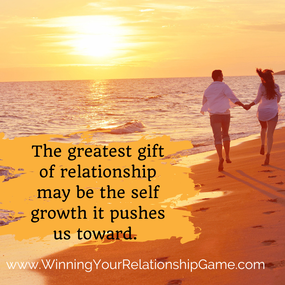 In addition, happy relationships contribute to longer, happier lives, better mental health and financial stability. These are really practical reasons that being in relationships is good for us. The greatest gift of relationship may be the self growth it pushes us toward. Because of our patterns of attraction, attachment and self management, our most significant relationships will bring attention to all our sharp edges. There are times when committed relationships feel limiting. The opposite is actually true! Relationships can open us up to more freedom, opportunities and growth. So often, we focus on what we lose as an individual while ignoring what we gain as a couple. Feeling Greater! Allison |
Helping You
|



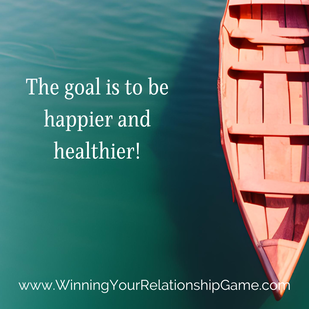


 RSS Feed
RSS Feed

